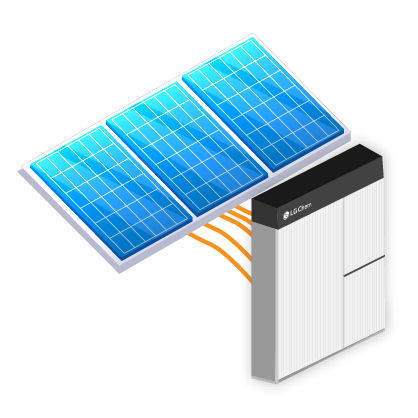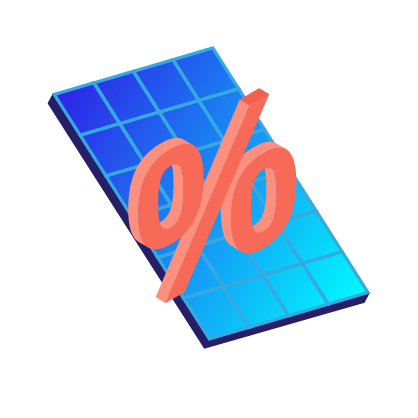How Long Do Solar Panels Last on a House?
Like buying a house, solar panels are a long-term investment. The longer you own them, the greater the return on investment.
In fact, if you own them long enough, your energy savings can reach hundreds of thousands over the life of the solar system.
But since solar is a long play, it’s only natural to wonder how long solar panels will last on a house before investing in them. In this article, we’ll cover how long solar panels last, how solar warranties work, what causes solar panels to degrade, and how to maximize the life and savings of your panels.
Let’s get started with the big question.
How long do solar panels last on a house?
Solar panels have a productive lifespan of 25 to 30 years, and can continue to produce cheap electricity much longer than that. In fact, many of the first residential solar panels installed in the 1980’s are still performing at effective levels, according to the Solar Energy Industries Association (SEIA).
The average payback period for home solar is around 8 years – although it ranges from 5 to 15 years. For most homeowners, that leaves 17-22 years of savings and return on investment for a solar system that lasts 25-30 years.
What happens to solar panels after 25-30 years? Do they spontaneously combust into stardust?
No, 25-30 years is just the typical benchmark for guaranteed performance. Solar panels will continue to produce after the 30 year mark, albeit at a lower rate each year due to a process called degradation.
For homeowners, that means that after three decades a solar system may not produce enough electricity to meet the goals it was designed for. However, by that time, the system has likely paid for itself several times over, your energy goals have changed, and newer technologies will be ready to take its place.
Another way to answer “how long solar panels will last on a house” is we don’t know. Panels made in 1992 are just now turning 30 years old, and today’s panels are leaps and bounds more efficient and durable. I guess we’ll find out in 30 years how they hold up.
How long do solar panel warranties last?
The best way to protect your long-term solar investment is to buy panels with long and robust warranties.
There are three types of warranties that typically apply to solar systems:
- Manufacturer performance warranties: typically 25-30 years
- Manufacturer product or workmanship warranties: typically 10-12 years
- Installer workmanship warranties: up to 20 years
There’s a fourth type of warranty for homeowners that purchase solar through solar.com and its affiliates (Electrum and Pick My Solar) called the TriGuard Guarantee. This exclusive marketplace warranty covers:
- System production for the first 12 months
- Installer workmanship for 10 years
- Manufacturer performance (25 years) and workmanship (10 years)
Let’s go over the more common warranties.
Related Reading: How To Choose Solar Panels for Your Home
Performance warranties
As the name suggests, solar performance warranties guarantee that panels have the ability to perform at a certain level for 25-30 years. It does not guarantee a certain amount of production from your system.
Today’s solar panels typically have warranties that guarantee performance at 85% maximum output or greater after 25 years, although some of the best solar panels are guaranteed to perform at 92% after 25 years.
And now manufacturers including Canadian Solar, Hyundai Energy Solutions, and Aptos Solar are offering performance warranties for greater than 80% after 30-years.
Product/workmanship warranties
Solar manufacturer product warranties, also known as workmanship warranties, protects homeowners from defective materials or workmanship issues stemming from the manufacturer.
These typically last 10-12 years and cover the cost of the equipment, but not the cost of labor or shipping.
Installer workmanship warranties
The third way to safeguard your solar system is with an installer workmanship warranty. This is how reputable solar installers stand behind their work.
Installer workmanship warranties typically cover the labor and material costs for repairing damage from faulty installation, such as roof leaks stemming from the solar installation.
In order to maximize your return on investment, it’s important to choose a solar installer with a robust workmanship warranty and solid track record. This warranty won’t do much good if the installer goes out of business or leaves town, so it’s important to choose an installer that’s already well-established in your area.
Get multiple quotes from vetted installers. Start here.
How often do solar panels fail?
A 2017 study examining solar installations between 2000 and 2015 found an annual median failure rate of just five out of 10,000 panels – or 0.05%.
Trends forecast that the failure rate will continue to decrease as technology advances, which seems especially promising when considering that the failure rate was twice as high between 1980 and 2000.
With that said, solar warranties typically don’t cover unforeseeable events, also known as “Acts of God” or force majeure. These include war and natural disasters such as a hail, earthquake, fire, etc. Depending on where you live, natural disasters can pose a rise to the longevity of your solar system. However, your solar system can also be a lifeline and a source of energy during natural disasters and power outages.
Related reading: Can Solar Panels Withstand a Hurricane?
Why don’t solar panels last forever?
Solar panels decrease in productivity over time due to a process called degradation.
Degradation is a natural process that occurs from prolonged exposure to UV rays and weather conditions. If you leave anything outside for 25 years, it’s going to experience some wear-and-tear.
But solar panels are designed to withstand and continue to perform in harsh conditions. In fact, a recent study by the National Renewable Energy Laboratory (NREL) found that the median degradation rate for today’s panels is just 0.5 percent per year, meaning that after 40 years the panels would still be producing electricity at 80% output.
Remember, solar panels don’t go POOF and disappear after they hit a certain age – they slowly decrease in productivity over time. The rate at which they degrade depends on environmental conditions.
What causes solar panel degradation?
The climate conditions in which you live can positively or negatively impact the lifespan of your solar panels.
Solar panels installed in cold climates with extreme snow loads and high wind often degrade more quickly than their counterparts in more temperate climates. However, panels in intense desert climates often have the highest levels of degradation and may even produce less efficiently on extremely hot days.
Solar panels are most effective when the temperature of the panels themselves is in the range of 59 to 95 degrees Fahrenheit. Within this range, they are more effective at the lower end than the higher end because panels tend to heat up more than the actual ambient temperature (akin to how a car’s glass will trap more heat on a hot day).
Three ways to make solar panels last longer on your house
The key to maximizing your investment in solar is maintaining optimum performance for as long as possible. Every hour your solar panels are in peak production is an hour you’re saving money on electricity.
This all begins even before solar panels are installed at your home.
Choose a trustworthy installer and quality equipment
Choosing a trustworthy installer and quality equipment is crucial for long-term success of your solar system.
We’ll be the first to admit that the residential solar industry is rife with scams and cut-rate installers. In fact, solar.com’s parent company, Electrum, was founded to bring transparency into the market to combat this problem.
Anybody can take your money and slap up a solar system – but reputable installers will guarantee their work and be around to honor that guarantee. Your installer should also have an established history in your area and a track-record of good reviews.
As for quality equipment, it can be tempting to try to save a few bucks on lower quality panels and inverters. But remember, solar is a long-game — you wouldn’t buy a rubber dinghy to sail across the Pacific Ocean. Paying a little more upfront for premium equipment with better performance warranties will more than pay itself off over the 25-30 year life of your system.
Finding trustworthy installers and quality equipment takes some legwork – but that’s why we’re here. Enter your zip code above to compare multiple quotes with a solar.com Energy Advisor.
Monitor and service your solar system
Quality solar systems come with interfaces (like a mobile app or a website) that allow you to track your solar production. Monitor your system regularly to ensure maximum efficiency and to quickly address any issues.
For example, if you see a drop in performance while your panels are clean, it may be worthwhile to have a professional check your equipment for two reasons:
- Less production = less savings
- The issue could linger and effect the long-term health of your system
In most cases, it’s best to nip any issue in the bud before it grows and eats further into your savings. That’s where your installer and manufacturer warranties come into play.
Monitoring and maintaining your solar system regularly can extend its life, maximize its performance, and add to your return on investment.
Keep your panels clean and clear of debris
Solar panels require very little maintenance to continue producing at optimal efficiency. However, removing debris like dirt, leaves, and bird droppings can improve your module’s output and increase your savings.
Remember, the trick to maximizing your return on investment is to keep your system performing as efficiently as possible for as long as possible.
We recommend cleaning your panels once every three months and keeping the site clear of tree branches. If you have tilted panels and live in a more temperate climate, your system will likely be washed by the rain and you might not need to do quite as much cleaning. Panels in desert climates may require a greater amount of cleaning due to the accumulation of dirt and debris.
One of the easiest ways to keep your panels clean is by rinsing them down with a hose. If your panels are accessible, soapy water and a soft brush or good sponge are generally all that’s necessary to remove buildup. However, you should never use hot water on cold panels.
Additionally, refrain from utilizing products like RainX or rock salt, as well as metal or abrasive products. These can scratch the panel’s glass, leave streaks, or stain – all of which end up decreasing the production efficiency.
Check out our SolarBook video on Solar Panel Maintenance:
How long do solar panels last on a house? It’s up to you!
Everybody’s solar system is different, but most systems can be expected to last at least 25-30 years before performance degrades significantly.
With the average payback period around 8 years, that’s more than enough time for a system to pay itself off several times over. The trick to maximizing the return on investment for a solar system is to keep it running at maximum performance for as long as possible.
Regularly cleaning and maintenance can help, but the most crucial key to success is choosing a trustworthy installer and quality equipment from the very beginning.
Get started by entering your zip code above.
How long do solar panels last FAQs
How long do solar panels last on a house?
Today’s solar panels typically maintain 85% performance over 25-30 years and can be effective for much longer. In fact, there are still solar panels operating that were installed in the 1980’s.
The key to an effective and long-lasting solar system is choosing warrantied installers and equipment, monitoring productivity, and regularly cleaning the panels.
How often do you replace solar panels?
Solar panels can be replaced when they are no longer producing enough electricity to meet your energy goals. According to the National Renewable Energy Laboratory (NREL), today’s panels degrade at around 0.5 percent per year, which means they’re performing at 90% capacity after 20 years and 85% after 30 years.
Solar engineers account for degradation and size your system accordingly. So even after 25-30 years, your system should still be fulfilling your energy needs.
How long do solar panels take to pay for themselves?
The average payback period for solar panels is around 8 years, but it can range from 5-15 years depending on sun exposure, price of grid electricity, and the equipment used.
To get a ballpark figure of your payback period, take the net cost of the solar system (after tax credits and rebates) and divide it by your annual electricity costs.
For example:
- Net solar system cost: $20,000 system – $6,000 solar tax credit = $14,000 net cost
- Annual electricity costs: $145 monthly electric bill x 12 months = $1,750
Payback period = $14,000 / $1,750 = 8 years
Do solar panels lose efficiency over time?
Yes, through a natural process called degradation, solar panel production decreases over time. That average degradation rate for today’s panels is 0.5 percent per year, according to the National Renewable Energy Laboratory (NREL). That means a typical solar panel will perform at 90% capacity after 20 years and 80% capacity after 40 years.













